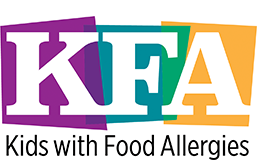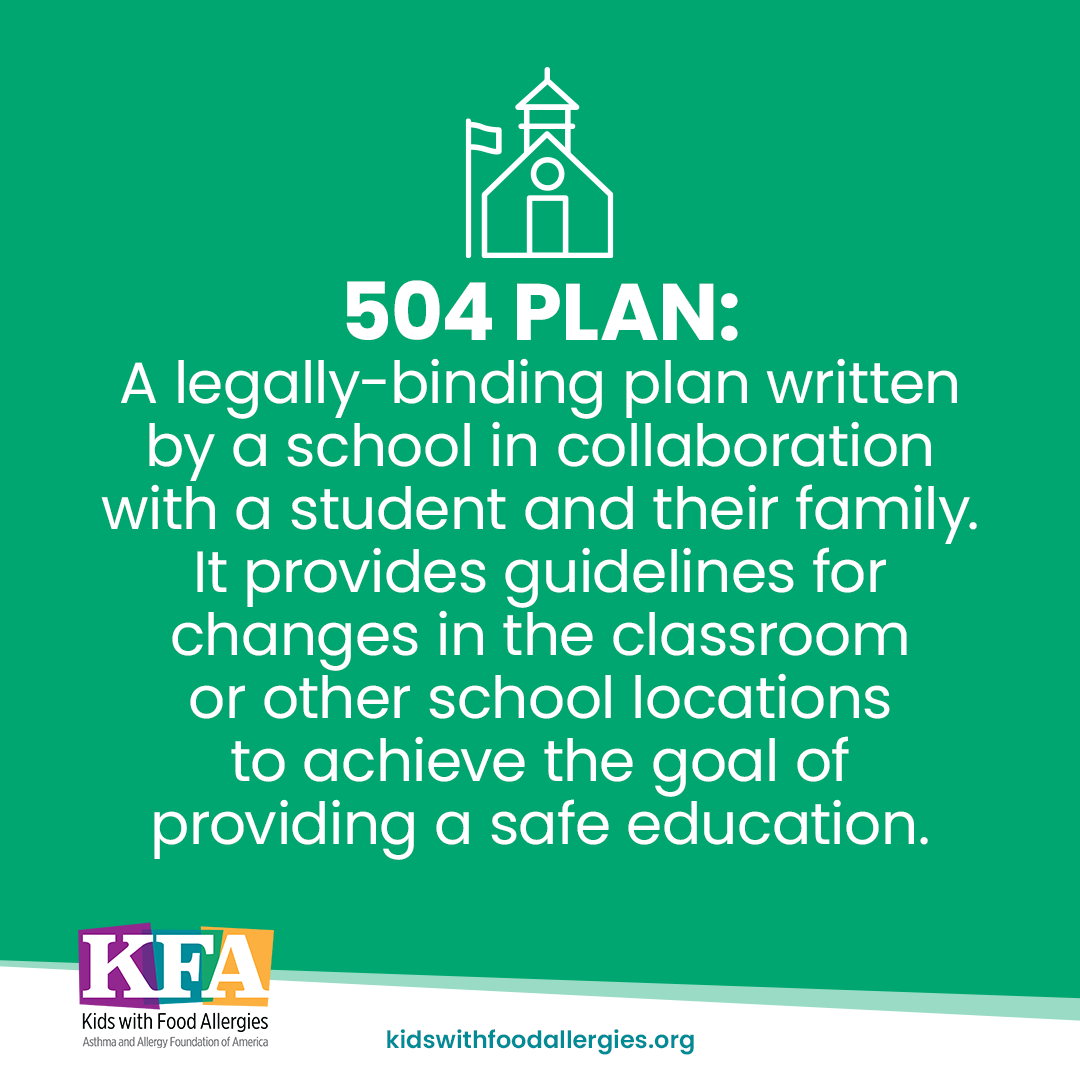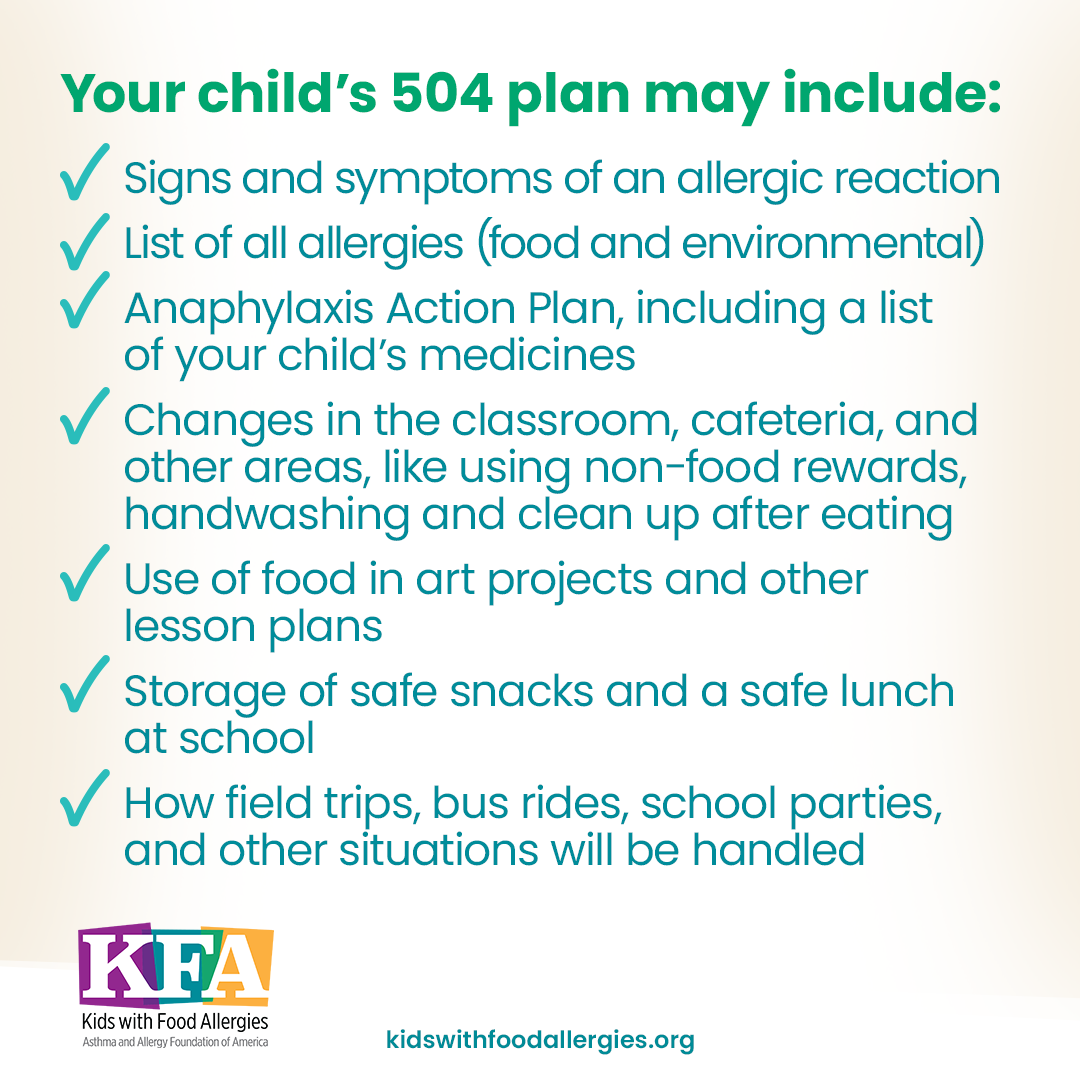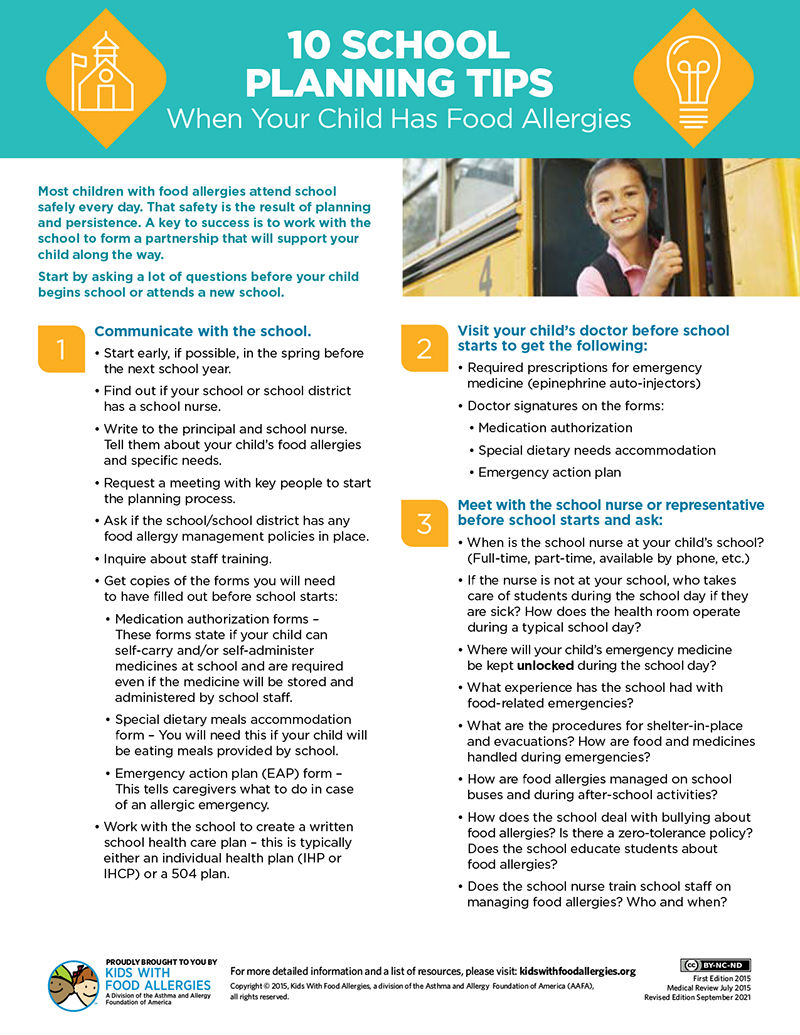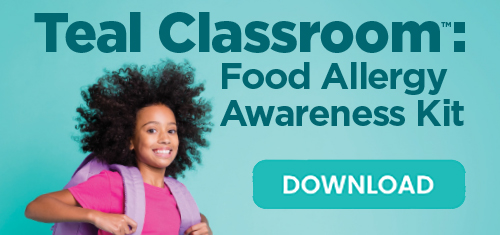Living with Food Allergies

Section 504 Plans for Students With Food Allergies
As a parent of a child with food allergies, you need to feel confident the school staff will manage your child’s food allergy properly.
Closed
What Is a 504 Plan?
A 504 plan is a legally binding care plan between you and your child’s school. It addresses how the school will accommodate your child’s food allergies.
Its name comes from the Section 504 of the Rehabilitation Act of 1973. Under this law, schools that get federal funding cannot exclude or discriminate against students who have disabilities.1 According to Section 504 and the Americans with Disabilities Act (ADA), a food allergy is often considered a disability depending on how severe the allergy is.
Does My Child’s School Have to Follow This Law?
All public schools, preschools, as well as private schools that get some form of federal funds, must follow this law.2 Colleges do not have to follow 504 plans but have obligations under Section 504.4
Does My Child Need a 504 Plan for Their Food Allergy?
Not all students with food allergies need a 504 plan.3 Think about your child’s needs. Does the school have a full-time nurse on site? Are the school’s resources limited? Does the school already have effective policies and procedures in place for managing food allergies? How well is the school responding and cooperating with requests?
Your child may only need an individual health care plan (IHCP or IHP), especially if the school already has food allergy policies in place.
But if your child has extra needs you are concerned about, you may want a 504 plan.
Does My Child Qualify for a 504 Plan?
Having a food allergy does not mean your child qualifies for a 504 plan. Your child must first be evaluated by the school to see if they are eligible for a 504 plan. Your child must meet the official definition of having a disability.
To help the school with this process, have documents from your child’s doctor showing that your child’s food allergy seriously limits a “major life activity.” Eating is a major life activity.
How Do I Start the 504 Plan Process?
Contact the school principal and the school district’s 504 coordinator in writing about your child’s food allergy. Ask to have your child evaluated for eligibility for a 504 plan. Once they decide your child is eligible, ask for a meeting to start creating a plan.
The goal of the plan is to ensure your child’s health and manage their food allergies while at school. So you’ll want to try to do this well before the beginning of the school year. This way the plan can be in place before your child sets foot on campus.
Approach the school with a positive tone. Think of yourself as part of the team that will work together to keep your child safe at school. Communicate often, calmly, and with confidence.
What Accommodations Should I Ask For?
Have some accommodations in mind before your first meeting with the school. Here are some examples of items your 504 plan might include:
- Signs and symptoms of an allergic reaction
- List of all allergies (food and environmental)
- Anaphylaxis Action Plan, including a list of your child’s medicines
- Changes in the classroom, cafeteria, and other areas, like using non-food rewards, handwashing and clean up after eating, etc.
- Use of food in art projects and other lesson plans
- Storage of safe snacks and a safe lunch at school
- How field trips, bus rides, school parties, and other situations will be handled
What If There Is No School Nurse on Site?
Not all schools have a nurse who is on campus every day. And if your school does have an on-site nurse, they might not be available when an emergency happens.
Each state has laws about who can give your child medicine in an emergency. Plus, all states have “Good Samaritan” laws. These say that in an emergency, someone who is not a nurse can do their best to help your child.
It is important to give the school a written emergency care plan from your child’s doctor. This will tell school staff how to recognize and treat an allergic reaction.
How Do I Create a 504 Plan?
You will work with the school to create a 504 plan. You can find sample 504 plans online. Your school district may also have forms or formats. You can use these as a starting point and then make changes to fit your child’s needs. But the federal government has not created an official 504 form.
In general, your child’s 504 plan should address:
- Responsibilities – Who will be responsible for what?
- Training – What training will be required? Who will deliver this training? Who will be trained?
- Services – What special services, if any, will the school provide to keep your child’s environment safe? Will they give your child medicine? Change the classroom environment? Make menu changes?
- Policies – What policies need to be in place to keep your child’s environment safe?
- Emergency response – What is the emergency treatment plan if your child has an allergic reaction at school?
Do I Have to Get a 504 Plan in Writing?
You do not have to get your child’s 504 plan in writing. But it is best to have a written plan. This can reduce mistakes or misunderstandings. Make sure all staff members who interact with your child have a copy of the written plan. This includes classroom teachers, substitute teachers, other teachers (gym, music, art), custodians, and lunchroom staff. Only the 504 coordinator and the parents need to sign the written plan.
What Do I Do If the School Refuses to Accommodate My Child?
All public schools and private schools that accept federal funding must accommodate your child. Some parents, though, may run into issues, such as:
- The school refuses to create a 504 plan after evaluating your child and finding them eligible
- The school creates an unacceptable 504 plan leading to allergic reactions
- The school creates an acceptable 504 plan but then does not follow it
If the school says that they “do not do 504 plans for food allergies,” tell them this is not acceptable under the law.
Schools must create due process that includes parental notification and review requirements. If the school creates a 504 plan that does not include any of your requests, you do not have to agree to it. If this happens, write a letter to the school consistent with the procedures laid out. Let them know you do not agree with the plan and are asking for another evaluation meeting. Remind them you have the right to be involved with creating your child’s 504 plan.
Your requests should be reasonable and focus on the accommodations that are needed to keep your child healthy.
Stay calm and polite at that meeting. Explain why the plan that the school wrote is not acceptable. List what parts you disagree with. State why the changes you asked for are needed.
If the school still refuses to cooperate, you can file a complaint with the Federal Department of Education Office for Civil Rights. You may also be able to file a complaint with your state Board of Education. Your state may already have a process for this.
What Happens If My Child Moves to a New School?
If your child already has a 504 plan in place when you move, the plan follows your child.
Contact the new school and let them know your child has a 504 plan. Send them a copy of the plan. If the school feels it is an appropriate plan, they must put it in place as is.2
Sometimes, a school may say the existing 504 plan will not work for their school. In this case, they have to follow your existing plan until a new plan is in place. Ask for a new 504 planning meeting with the new school.
Can My Child Have a 504 Plan in College?
Colleges that get federal funding must follow Section 504 and comply with ADA. But colleges aren’t required to follow a 504 plan the way elementary and secondary schools are. They are held to a different standard. If what you are asking for is a “fundamental alteration” of their program, or if it causes them an “undue burden” (usually a financial burden), they can say no to your r
Food Allergy Fact
A school health plan is an important part of your child’s food allergy management plan.
Reviewed July 2021 by Naomi Seiler, JD, George Washington University
References
